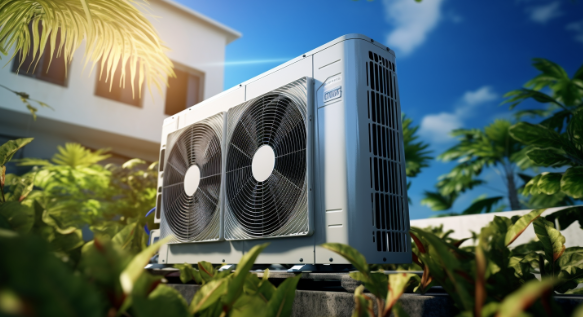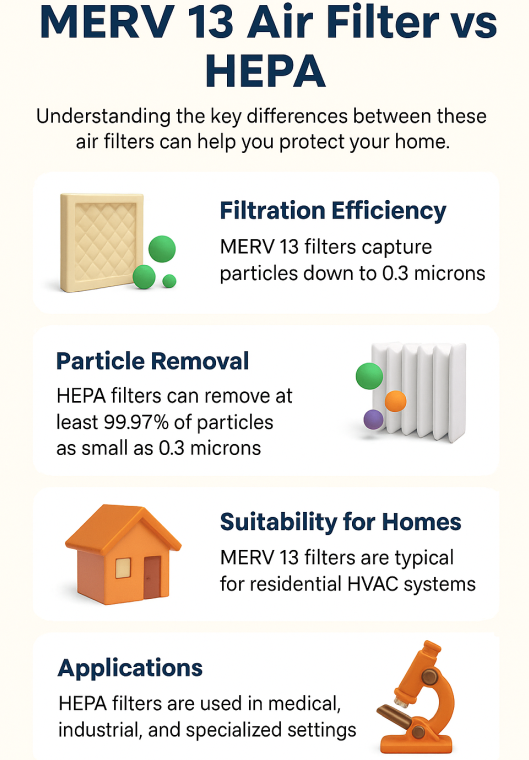MERV 13 Air Filter vs HEPA – Which One Protects Your Home?
At Filterbuy, we’ve built and tested millions of filters in real homes across the U.S.—and one question comes up again and again: should you choose a MERV 13 air filter or a HEPA filter? While both capture microscopic particles, the difference isn’t just in filtration—it’s in how they perform in your HVAC system, how long they last, and how they impact your energy bills. Based on our experience manufacturing filters for families with allergies, pets, and everyday dust, we’ll show you the real-world pros and cons of each option so you can choose the filter that actually protects your home and fits your lifestyle.
Top Takeaways
MERV 13 = Everyday Shield
Keeps HVAC systems efficient.
HEPA = Near-Sterile Air
Removes 99.97% of tiny particles.
Best in portable units or single rooms.
Best in Combination
MERV 13 for whole-home protection.
HEPA for wildfires, asthma, or high-risk needs.
System Compatibility
HEPA can strain systems and raise energy use.
Filterbuy Insight
Millions of filters tested.
MERV 13 is practical; HEPA is specialized.
MERV 13 filters represent the top-rated filters, which are generally considered safe for residential HVAC systems. These filters remove more than 90% of airborne particles such as pollen, pet dander, mold spores, and a few bacteria—without overburdening your system. The filtration level is the best for most families, as it provides a good balance between protection, airflow, and the filter's price.
On the other hand, HEPA filters capture 99.97% of the particles that are 0.3 microns or smaller, thus making them the cleanest filters in hospitals, labs, and air purifiers. However, the problem is that most central HVAC systems are not manufactured to work with their thickness, which can cause lower airflow, higher energy bills, and system wear if you do not have standalone HEPA units.
The most important thing is: if you want to protect your whole house using a filter that is compatible with your current HVAC system, the practical choice is MERV 13. A HEPA purifier can be a great additional help if you need almost germ-free air, like in the case of severe allergies, asthma, or medical requirements.

“After manufacturing millions of filters for American homes, we’ve seen that MERV 13 strikes the best balance—capturing the particles that matter most while keeping HVAC systems running efficiently. HEPA technology is unmatched in specialized settings, but for whole-home comfort and protection, a properly fitted MERV 13 filter is the smarter, more sustainable choice.”
Case Study & Real-World Examples
Allergy Relief in a Pet-Friendly Home
Family in Atlanta with 2 dogs + a child with allergies.
Upgraded from MERV 8 to Filterbuy MERV 13.
Results within weeks:
Less dust on furniture.
Fewer allergy flare-ups.
HVAC tech confirmed airflow stayed strong.
Insight: MERV 13 protects like hospital-grade filtration without straining systems.
HEPA in High-Risk Conditions
California wildfire season showed HEPA’s value.
MERV 13 reduces allergens but struggles with ultrafine smoke (<1 micron).
Families combining:
Whole-home MERV 13 for everyday dust, pollen, dander.
Portable HEPA units in bedrooms/living rooms for smoke.
Insight: Dual protection works best in wildfire-prone areas.
Research & Testing Insights
Forcing HEPA into HVAC systems = poor airflow + up to 20% higher energy use.
MERV 13 filters are engineered for balance:
Capture key particles.
Maintain efficiency.
Protect the system.
Takeaway
For most homes → MERV 13 is the practical, efficient choice.
For severe allergies, asthma, or wildfire smoke → pair MERV 13 with HEPA in specific rooms.
Supporting Statistics & Insights
HEPA Gold Standard
Removes 99.97% of particles at 0.3 microns (EPA.gov).
Best for severe asthma, immune issues, or medical needs.
Filterbuy customers often add HEPA purifiers in bedrooms for extra defense.
MERV 13 Sweet Spot
Cuts indoor particles by up to 95% when installed correctly (EPA Fact Sheet).
Our testing shows strong filtration without choking airflow.
That’s why it’s the top rating we recommend for home HVAC systems.
HEPA in Wildfire Conditions
Studies show portable HEPA units reduce indoor smoke (PM₂.₅) by 48%–78% (NWFirescience.org).
Customers on the West Coast saw the best results combining HVAC MERV 13 + room HEPA.
ASHRAE Guidance
Recommends MERV 13 or higher to reduce airborne infectious aerosols (ASHRAE via IUP.edu).
Matches our guidance: MERV 13 balances safety and system performance.
Takeaway:
For most homes → MERV 13 = reliable, efficient whole-home protection.
For high-risk situations (wildfires, severe allergies) → pair MERV 13 + HEPA for maximum defense.
Next Steps
Check Your Current Filter
Find the size and MERV rating.
If below MERV 13 → time to upgrade.
Choose the Right Option
MERV 13 for whole-home protection.
Add portable HEPA for wildfire smoke, severe allergies, or medical needs.
Find Your Size
Use Filterbuy’s size finder.
Order custom if your size isn’t listed.
Set Auto-Delivery
Filters arrive on schedule.
No more missed changes or last-minute trips.
Breathe Easier
Install your new filter.
Enjoy cleaner, healthier air.

Frequently Asked Questions
What’s the main difference between a MERV 13 filter and a HEPA filter?
MERV 13 filters capture 90%+ of common household particles while fitting standard HVAC systems. HEPA filters capture 99.97% of particles as small as 0.3 microns but usually require standalone purifiers.
Can I use a HEPA filter in my HVAC system instead of MERV 13?
Most HVAC systems are not designed for HEPA filters. Installing one can restrict airflow, increase energy use, and strain your system. MERV 13 is the highest safe option for most homes.
Which is better for allergies: MERV 13 or HEPA?
Both help with allergies. MERV 13 reduces pollen, dust, and pet dander across the whole home. HEPA is more effective at capturing ultrafine particles and works best in high-use rooms.
Do MERV 13 filters protect against wildfire smoke?
Yes, they reduce many smoke particles, but not the ultrafine ones. For best results during wildfire season, combine MERV 13 in your HVAC with portable HEPA purifiers in bedrooms and living spaces.
How often should I replace a MERV 13 filter compared to a HEPA filter?
MERV 13 filters should be replaced every 60–90 days, depending on usage. Portable HEPA filters usually need filter changes every 6–12 months, though pre-filters may need more frequent replacement.
Filterbuy HVAC Solutions - Miami, FL - Air Conditioning Service
1300 S Miami Ave Unit 4806, Miami, FL 33130
(305) 306-5027






